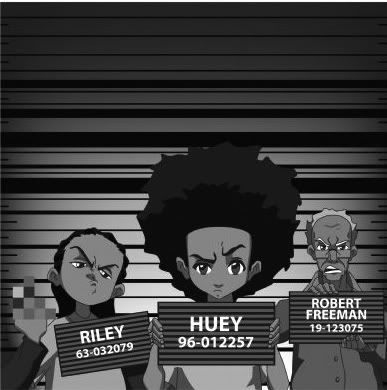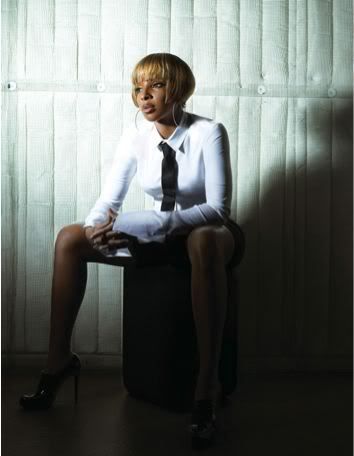
"Excuse me. I have brief announcement. Jesus was black, Ronald Regan was the devil and the government is lying about 9/11. Thank you for you time and good night." Huey Freeman- "The Boondocks"
“Don’t make sense for Obama to win/if Hilary still getting votes from ya mama and them”
Jadakiss-“Mornings was Hashbrowns” Freestyle
“I’m not sure America is ready for a Black President.” 50 Cent to Bill O’Reily- February 2008
The Boondocks is one of the last television shows in mainstream media that provides a honest, truthful critique of contemporary Black life. As African-Americans are no longer the largest “minority” population, and America continues to promote a “color-blind,” “racism is of the past” rhetoric, often we fail or are afraid to speak truthfully and candidly about race relations in society today. Comedy, parody, and satire have always been an outlet for political and societal critique. Richard Pryor did it; Dick Gregory did it; Dennis Miller did it; Dave Chappelle did it; Bill Maher does it. In their own way, each have pushed taboo or ignored topics into our daily conversation and consciousness.
Aaron McGruder has used
The Boondocks cartoon strip and television series & to push us further then we have been pushed in quite sometime.
He’s forced us to seriously think about how it would be if Dr. King were alive today; he’s forced us to remember the people from the Gulf Coast affected by Hurricane Katrina (just in case we forgot about the people in the Superdome); he forces us to rethink who are our “black leaders;” he forces us to rethink hip-hop’s place in our lives; he forces us to rethink ourselves.
But when he forces us to rethink what is BET about… that’s when the trouble starts.
It is indicative of the classic struggle: how do we challenge the people in control? And how do we challenge ourselves to be more just, more objective, more thoughtful?
The spirit of expression, resistance, and confrontation that is indicative of
The Boondocks, is the same spirit we find in the essence of Hip-Hop.
The question is does Hip-Hop have the courage to ignore the profits, riches, and fame, to challenge society to be better, and to change?
So when one presidential candidate runs on a slogan that reads “stand for change,” and he has convinced people to buy into, it speaks volumes.
As presidential hopeful Barack Obama drives through
America’s political landscape on the vehicle of hope, change, and a future which involves
all Americans, it seems the Hip-Hop community has taken notice.
He’s made Jadakiss mention him in a freestyle, Kidz in the Hall make a Obama campaign song, will.i.am put together a pro-Barack music video, and brought Tatiana Ali back to our conscious (wasn’t she the last person you expected to see in that music video).
Hip-Hop stars say vote for Barack and P.Diddy gets on his knees to beg us to vote: SO WHAT?
Is putting the 2008 Election and politics into the young hip-hop generation’s frame of reference important? YES.
But it takes more than yelling “Go vote!!!!!”
or telling people who to vote for.
We need people to be informed about how delegates work in primaries, why the dollars is losing value everyday, why fixing the Social Security system is important (haven’t heard about that one in a while right?), and what are we going to do to integrate the brothers and sisters who were jailed in droves during the late 1980’s and early 1990’s and are now coming home (look around at hoods all over America, they’re home) into today’s society and economy.
(If you have not noticed by now, or have refused to notice up to this point) Hip-Hop music and culture is the point of entry for those trying to reach, cultivate, and work together with the young people of this country (and for that matter, around the world).
But all the voices in the movement must be heard: the “backpackers”, the “gangsters”, the “skateboarders”, the “old-heads”, the “hip-hop historians and scholars.”
All have a part in the narrative.
All must push each other address to be open, honest, and candid.
When Bill O’Reilly can sit in 50 Cent’s car, interview him, then come on the air and call him a “pinhead,” we know there’s a problem.
When there are people in
Haiti forced to eat mud pies for subsistence, we know there’s a problem.
When there are people who won’t vote for a
Black man to become president because they are afraid he would be assassinated (contrary to your first reaction, 50 Cent is NOT the only person who thinks this… talk to any American 50 years old or older who can remember JFK, RFK, or MLK).
And when we can not challenge the number one mainstream hip-hop and Black entertainment outlet on television, we know there is a problem.
We must use our minds, our hearts, and our voices to strike back.
Michael Partis
michaelpartis@gmail.com
myspace.com/hiphopthought
http://michaelpartis.blogspot.com/
The Problems:
Poor Haitians Resort to Eating Dirt (I wasn't playing...)
http://abcnews.go.com/Health/wireStory?id=4212012
Barack's Speech the night of the New Hampshire Primary (you saw the music video, listen to the speech)
http://www.youtube.com/watch?v=Fe751kMBwms
The Root
About UsThe Root is a daily online magazine that provides thought-provoking commentary on today's news from a variety of black perspectives. The site also hosts an interactive genealogical section to trace one's ancestry through AfricanDNA.com, a DNA testing site co-founded by Henry Louis Gates, Jr., who is also The Root's Editor-In-Chief. The Root aims to be an unprecedented departure from traditional American journalism, raising the profile of black voices in mainstream media and engaging anyone interested in black culture around the world.
http://link.brightcove.com/services/link/bcpid1381640169/bclid1385253087/bctid1386343372 "Girl Like Me"
Color is more than skin deep for young African-American women struggling to define themselves.http://www.youtube.com/watch?v=YWyI77Yh1Gg


